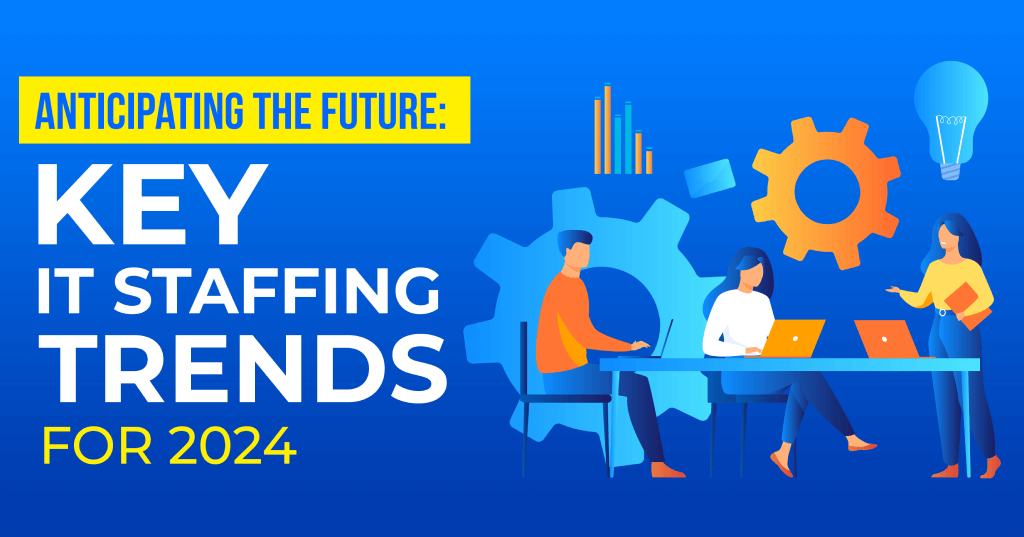Anticipating The Future: Key IT Staffing Trends For 2024
Predicting the future, especially in the IT industry, is hardly easy, with the market ever-evolving and dictating new terms by the year. Still, our rich experience allows us to make IT staffing industry trends predictions for the coming year with some degree of certainty.
To employers and job seekers across the world – this article is for you. In it, we’ll delve into key IT staffing trends, providing a detailed analysis of how they will impact the industry and what you can do to prepare for the future.
Reskilling and Upskilling
From our experience, we expect that in 2024 the trend towards reskilling and upskilling will intensify. More and more companies are recognizing the importance of keeping their workforce equipped with the latest skills and knowledge, not just to survive but to thrive in a changing digital landscape.
We believe that training programs will become increasingly tailored to the specific skills demanded by emerging technologies such as AI, cloud computing, and cybersecurity. As AI systems evolve, they may even be utilized to identify skills gaps more precisely, enabling teams to create highly targeted training programs.
Companies will also invest heavily in partnerships with educational institutions, online learning platforms, and specialized training providers. Depending on the training budget, these programs may encompass a wide range of formats, including VR and AR simulations, hackathons, and microlearning modules.
Remote Work and Hybrid Models
The COVID-19 pandemic reshaped the way we work, accelerating the adoption of remote work – however, it’s hard to ignore the fact that some companies have developed a degree of telecommuting fatigue. That’s why, we do believe that telework will continue to be a dominant force, but a shift toward hybrid models is also likely.
Telecommuting will remain attractive for its ability to access global talent, reduce office costs, and promote work-life balance; while hybrid models will gain traction due to the recognition that some tasks and collaborations are more effective when conducted in person.
Overall, we can expect teams to continue developing their technology infrastructure to support remote work, including high-speed internet access, collaboration tools, and advanced security measures. However, to maintain productivity, more strict and refined policies for working remotely may need to be implemented.
Diversity and Inclusion Initiatives
Beyond the moral imperative, our prediction for 2024 is that diverse teams will play a pivotal role in driving innovation and solving complex technological challenges. Companies will not only prioritize diverse hiring but also invest in creating inclusive cultures.
There’s also an indication that teams will adopt data-driven approaches to diversity, using analytics to identify bias in hiring processes and promote healthy corporate practices. We also see employee resource groups (ERGs) gaining more weight in corporate environments as they foster connections between team members.
On top of that, inclusive leadership training will remain prominent, as managers from all over the world have long understood the value of diverse perspectives and inclusivity promotion.
AI and Automation in Recruitment
AI and automation tools integrated into the recruitment process have already transformed how HR departments operate – and there’s no reason to believe that these technologies will stop evolving. AI algorithms will become increasingly sophisticated, allowing for better candidate matching and predictive analytics to identify high-potential candidates; and HR automation may go beyond initial screening to interview scheduling, candidate feedback, and even onboarding.
We can also predict that AI-powered chatbots and virtual assistants will be more commonplace in HR departments, offering instant responses to candidate queries and streamlining communication. However, teams will need to be careful when implementing those as too much automation can lead to candidates being discouraged during the recruitment process.
Emphasis on Soft Skills
While technical skills remain crucial in IT staffing, in 2024 we can expect the trend for an increased demand for soft skills, which has been growing for the past decade or so. More and more employers are recognizing that success in IT projects often hinges on effective communication, adaptability, problem-solving, and teamwork.
That’s why we think that this trend may result in a shift in the way job descriptions are crafted. Employers will not only seek technical proficiency but will focus even more on the essential soft skills required for each role. We’ll also see employers using behavioral interviews, role-playing exercises, and psychometric assessments to evaluate candidates’ soft skills.
Promoting Internal Candidates
Last but not least of the IT staffing market trends, companies are increasingly recognizing the value of promoting from within. We believe that internal promotion programs will expand and diversify, encompassing not only technical skills but also leadership and management development. We also expect that internal candidates will have a more structured path for career progression within their organizations, as career ladders, mentorship programs, and opportunities for cross-functional training will become more commonplace.
Companies will also continue to measure the success of their internal training programs through KPIs such as retention rates, promotion rates, and employee satisfaction scores. And leadership development programs will focus on nurturing future IT leaders from within the organization, equipping them with the skills and knowledge needed to take on more significant roles.
Conclusion
As we anticipate the future of IT staffing trends in 2024, it’s very likely that a combination of reskilling, remote work flexibility, diversity and inclusion initiatives, AI-driven recruitment, soft skills development, and internal talent promotion will define the landscape. Embracing these trends and staying adaptable will be key for both employers and IT professionals looking to thrive in this ever-evolving field.

